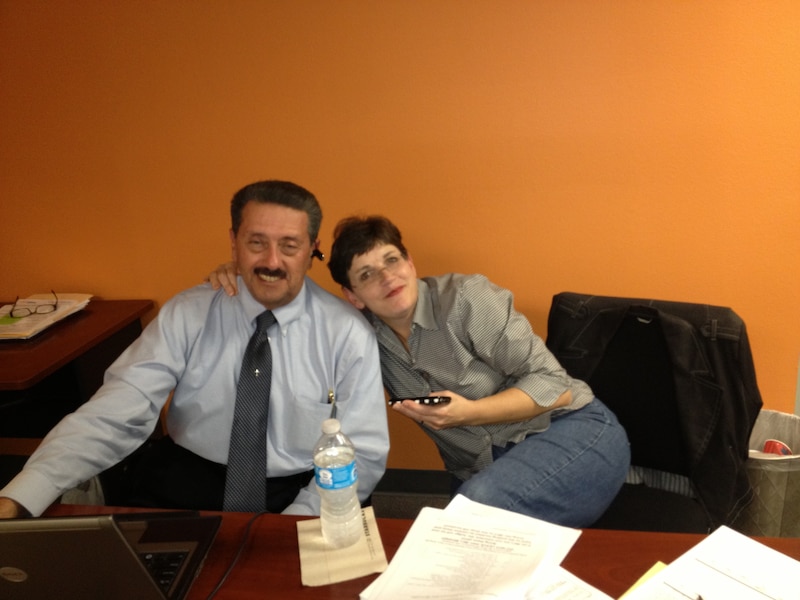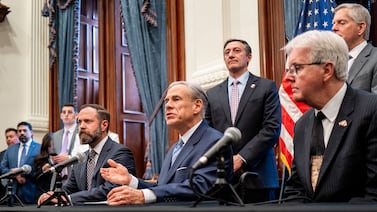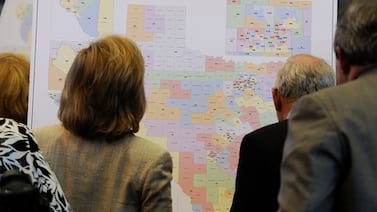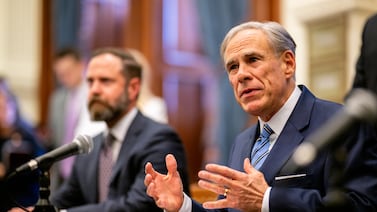Votebeat is a nonprofit news organization reporting on voting access and election administration across the U.S. Sign up for our free newsletters here.
Alan Vera, an influential Republican voter-fraud activist who pushed controversial election bills in Texas, died Thursday at the Texas Capitol as he was preparing to testify on election legislation. He was 75.
The news was announced suddenly during a Texas House Elections Committee meeting Thursday morning as the committee heard public testimony on one of about a dozen bills that would give the state more oversight of elections. At the podium, Harris County Republican Party Chair Cindy Siegel stumbled over her words and apologized to the committee. “I just heard about Alan, so I am upset,” Siegel said.
Committee Chair Reggie Smith, a Republican, asked for a moment of silence for “our friend Alan.”
Vera, an influential figure in Texas voting policy, helped found Houston-based True the Vote, a conservative nonprofit focused on voter fraud, and had been the Harris County GOP ballot-security chair since 2014. Well-respected among Republican lawmakers, he was frequently called to testify as a witness on election-related legislation.
Vera had been at the Texas Capitol almost every week this legislative session to testify on election legislation. Only two weeks ago, during a House Election Committee hearing, lawmakers sang “Happy Birthday” to Vera while he was at the podium and handed him a cookie with a candle in it.
“We lost a titan. Alan’s life was dedicated to selfless service, as seen from his time in the military, to working tirelessly towards getting Republicans elected and doing everything in his power to ensure elections across the nation are safe and secure through education and advocacy,” Siegel said in a statement.
“At the Texas Capitol, he was always the first in the building and the last to leave as he devoted countless hours to testifying before the House and Senate, meeting with legislators, and speaking with other activists to push for election integrity legislation.”
An Army veteran, who grew up in El Paso, Vera had been active in election integrity issues with the Republican Party for more than a decade.
Although there’s no evidence of widespread voter fraud, Vera told conservative Texas activist and megadonor Steven Hotze in a video last fall that he and his wife, Colleen Vera, became inspired to investigate it after attending a rally in Washington in 2009 organized by conservative TV personality Glenn Beck.
“It’s all God’s work,” Alan Vera said in the video. “We went out as poll watchers throughout Harris County, just to observe what was going on. And the things we saw just made our skin crawl. We saw such blatant fraud, such disregard for integrity or for the laws, and that got us fired up.”

Vera and Catherine Engelbrecht founded True the Vote in 2010 and trained hundreds of poll watchers before he left the group to volunteer for the Harris County Republican Party. Vera was also known for frequently challenging the legitimacy of registered voters in Harris County. He challenged the voter registration of thousands of voters in 2018 and did so again last year.
He was among a group of Harris County Republican Party leaders who sued Harris County in 2021 over district maps that they argued would favor Democrats. The Texas Supreme Court rejected the challenge.
The Harris County Attorney’s Office announced last summer it was investigating allegations that an election integrity group for which Vera was a board member — the Texas Election Network — had been knocking on doors, verifying voters’ addresses and asking them to sign affidavits.
Vera gave presentations to Tea Party and Republican Party groups across the state about how to fight voter fraud and used those meetings to recruit poll watchers.
Vera communicated closely with Republican lawmakers, including state Sens. Paul Bettencourt and Bryan Hughes and Rep. Briscoe Cain, and made suggestions to them and their legislative staff as they worked to pass a sweeping 2021 election bill known as Senate Bill 1. Recently, Vera was also involved in drafting proposed legislation for Hughes that would require the state to withdraw from a multistate coalition that helps Texas to clean its voter rolls.
On Thursday, Engelbrecht described Vera as “a fighter” and “indefatigable.”
“Throughout our long friendship and all the challenges we faced, never once did he waver in his commitment to supporting voters’ rights,” Engelbrecht said. “And he didn’t just talk — he served, selflessly, year after year. Together with his amazing wife, Colleen, they defined servant leadership. I am proud to have served alongside him.“
Votebeat editorial director Jessica Huseman contributed to this story.
Natalia Contreras is a reporter for Votebeat and covers election administration and voting access in partnership with The Texas Tribune. Contact Natalia at ncontreras@votebeat.org.






